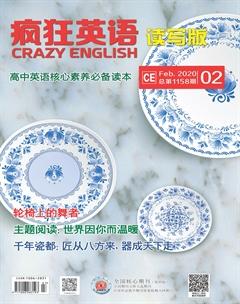千年瓷都:匠从八方来,器成天下走
周云
Porcelain(瓷器) craftsmen from home and abroad say the plan of turning Jingdezhen, a Chinese city renowned for its 1,700-year history of manufacturing(制造) porcelain, into a world ceramic cultural center, will attract more skilled artisans to introduce new ideas, strengthen exchanges and stimulate(刺激) the development of the ceramic industry.
In early October, 2019, the government of eastern China's Jiangxi Province revealed details of a new plan to build Jingdezhen into a national ceramic culture inheritance(傳承) and innovation pilot zone. One of its primary missions is to enhance(提升) international ceramic cultural exchanges and cooperation.
“It's nice and interesting to me, and also for all international artists who come here, to exchange thoughts and ideas on each other's work. People from Europe, Africa, America have come here to experience Chinese culture and learn from Chinese. At home, I have a big workspace, but it is refreshing to take a break, come here for three months and work on new projects,” says Christiane Toewe, a German ceramic artist who has visited Jingdezhen three times in recent years.
As one of the areas with the highest concentration of artistic talent in China, Jingdezhen has over 30,000 artists, including 5,000 foreigners, living in the city. Moreover, the city now boasts more than 6,700 ceramic enterprises and workshops and around 150,000 people work in porcelain-related industries.
For Japanese ceramist Takeshi Yasuda and his wife, who have lived in the city for 17 years, Jingdezhen is not only their creation base but also their second home. In Yasuda's eyes, foreign artists choose to come to Jingdezhen as it is a place where they can learn advanced skills in craftsmanship. In addition, artists are able to acquire precious materials and equipment to turn their visions into reality, which is sometimes difficult to achieve in their own countries. “Jingdezhen is a spectacle. You have new discoveries here every year. Its well-developed industry environment has attracted many young artists to start their business and create their own works,” says Yasuda.
As the city speeds up to transform itself into a world ceramic cultural center by 2035, Yasuda says Jingdezhen is taking a new development path. According to the plan, more high-level porcelain talent will be introduced to Jingdezhen, and both domestic and foreign scientific research and art institutions, along with relevant creative think tanks, are encouraged to establish branches in the pilot zone. The future of Jingdezhen will be brighter as it is building cultural confidence at a higher and more international level.
Critical Thinking
What do you think of the plan in the text?

